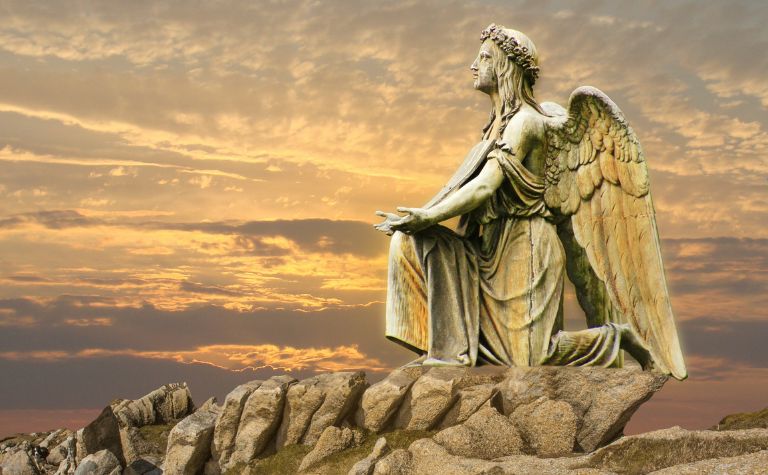From ancient to modern times, many people have been fascinated with angels. Many visualize them as spiritual messengers, guardians, and worshippers. Some imagine them as dressed in white with wings on their backs. Others see them as chubby babies or ordinary-looking adults. Those interested in Judaism wonder if Jews believe in angels and what they think about them.
Jews who are committed to the teachings of the Hebrew Bible believe in angels. Angles are central in stories like the Garden of Eden and Israel’s exodus from Egypt. In addition, significant Israelites believed in angels, like Abraham, Moses, Joshua, David, Solomon, Elijah, Daniel, and Isaiah.
Have Jews always believed in angels? How often does “angel” appear in the Hebrew Bible? Approximately how many different Hebrew words refer to angels? What are angels like in the Hebrew Bible? What do they do? Keep reading to learn the answers to these questions and others.
Also, see Do Angels Have Free Will? to learn more.

The First Jews Believed In Angels
Judaism is one of the oldest religions in the world. It started when God called Abraham to move to the land of Canaan, father a nation, receive his blessing, and be a blessing to others (Gen. 12:1-3). Yet, its roots are older than that, extending back to Noah, Shem, and Adam and Eve (Gen. 5:1-32; 11:10-32).
The name “Judaism” means “men of Judah” and comes from the tribe called Judah, named after one of Jacob and Leah’s sons (Gen. 35:23). The Hebrew Bible also calls them “Israelites,” a name that comes from when God renamed Jacob, Israel (Gen. 35:10). Earlier in their history, people called them Hebrews (e.g., Gen 41:12), likely after the language they spoke.
| Judaism’s Core Beliefs |
|---|
| There is one God |
| God has chosen the Jewish people to represent him on the earth |
| God has called Jewish people to obey the Torah |
| Gentiles (i.e., non-Jews) can participate in God’s blessing |
| The Messiah will appear at the end of time and bring peace |
Angels In the Early History of Judaism
Throughout their history, Jews have believed in angels. There has never been a time when angels didn’t play a crucial part in their story. Not only did Abraham, the forefather of the Jewish people, believe in angels; after all, one saved the life of his son, Isaac (Gen. 22:11), but his ancestors did, too.
For example, after God expelled Adam and Eve from the Garden of Eden, he placed an angel at its entrance to protect it (Gen. 3:24). Also, before the global flood in Noah’s day, the “sons of God,” which Jewish tradition interprets as fallen angels, were wreaking havoc on the Earth (Gen. 6:4; Isa. 14:12-20).
Job, a contemporary of Abraham, taught that angels existed before the Garden of Eden as they praised God when he created the world. First, he wrote, “Where were you when I laid the foundation of the earth? Tell me, if you have understanding.” Then, referencing angels, he added, “when the morning stars sang together and all the sons of God shouted for joy?” (Job 38:4, 7).
In summary, according to the Hebrew Bible, the Jewish people and their ancestors have always believed in angels. They believe angels are God’s servants who worship him, communicate on his behalf, and participate in and protect his plan for the world.
Also, see Do Angels Have Wings? to learn more.

What Does the Hebrew Bible Say About Angels?
In modern English translations of the Hebrew Bible, the word “angel” appears about 190 times. According to the book 40 Questions About Angels, Demons, and Spiritual Warfare, scholars estimate that as many as 16 words describe angels in the Hebrew Bible. [1] The most common Hebrew word for “angel” is malak which means “messenger.”
For example, malak is the word that appears when an angel saves Isaac’s life. Genesis 22:11 reads, “But the angel of the Lord called to him from heaven and said, ‘Abraham, Abraham!’ And he said, ‘Here I am'” (ESV, emphasis added). Writers sometimes use the same word when angels appear as men (e.g., Gen. 19:1).
Angels play different roles in the Hebrew Bible. In various situations, they worship God, help people with physical provisions, and lead, protect, and judge people.
Angels worship God
All angels worship God. They do this by obeying his instructions and serving his purposes in the world. Angels also worship God directly, meaning they praise him with words. For example, Isaiah 6:3 reads, “And one called to another and said: ‘Holy, holy, holy is the Lord of hosts; the whole earth is full of his glory!'” (ESV). Angels give people an example of how to worship God.
Angels minister to people
God sometimes sends angels to provide for his people’s needs. For instance, when the prophet Elijah needed nourishment, an angel appeared with food. “Arise and eat,” the angel told the prophet. So Elijah “looked, and behold, there was at his head a cake baked on hot stones and a jar of water. And he ate and drank and lay down again” (1 Kings 19:5-6).
Also, see Are Angels Aliens? to learn more.

Angels lead God’s people
After God freed the Israelites from slavery in Egypt, he used a pillar of cloud during the day and one of fire at night to remind people of his presence and lead them. An angel was associated with the pillars.
Exodus 14:19 reads, “Then the angel of God who was going before the host of Israel moved and went behind them, and the pillar of cloud moved from before them and stood behind them.”
Later in the narrative, God told Moses he would send an angel to help him navigate. Exodus 23:20 reads, “Behold, I send an angel before you to guard you on the way and to bring you to the place that I have prepared” (ESV). In these stories, angels are God’s servants, sent to help people reach their destination.
Angels protect God’s people and plan
There are many examples in the Hebrew Bible of angels protecting people. God protecting Daniel in the lion’s den is one example. “My God sent his angel and shut the lions’ mouths, and they have not harmed me, because I was found blameless before him; and also before you, O king, I have done no harm” (Dan. 6:22).
Another famous example was when angels defeated 185,000 Assyrian soldiers during the ministry of Elisha. 2 Kings 19:35 reads. “And that night the angel of the Lord went out and struck down 185,000 in the camp of the Assyrians. And when people arose early in the morning, behold, these were all dead bodies.”
Angels carry out God’s judgment
Angels also carry out God’s judgment on Israelites and non-Israelites. “And when the angel stretched out his hand toward Jerusalem to destroy it, the Lord relented from the calamity and said to the angel who was working destruction among the people, ‘It is enough; now stay your hand’ (2 Samuel 24:16a).
Angels carry out God’s punishment. Psalm 78:49 reads, “He let loose on them his burning anger, wrath, indignation, and distress, a company of destroying angels.”
Also, see Can Babies See Angels? to learn more.
References:
[1] 40 Questions About Angels, Demons, and Spiritual Warfare by John R. Gilooly. p. 35.
[2] Angels: Elect and Evil by Fred Dickason
Related Questions
Angels are God's ministering spirits (Heb. 1:14). They are intelligent, moral, worshipful, protective of God's holiness, and serve his plan for the world. Angels exist in various classifications,...
Misunderstandings about angels abound in the world today. Popular entertainment determines what many people think about them, including their appearance. However, the Bible is the sole authority on...
